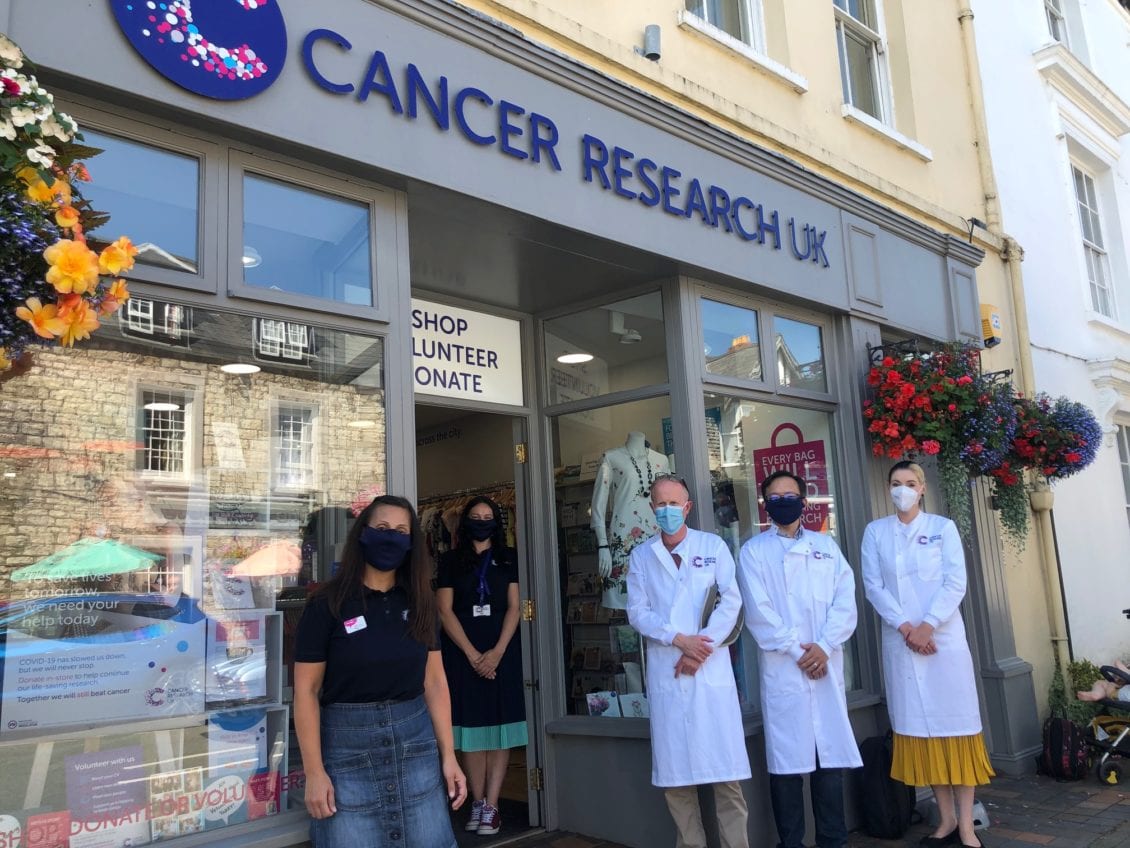SCIENTISTS are set to travel 260 miles and visit every Cancer Research UK shop in South Wales to help tackle the devastating loss of funding for research into the disease, caused by the COVID-19 outbreak.
Professor Duncan Baird, of the Division of Cancer and Genetics at Cardiff University’s School of Medicine and seven of his research team are determined to highlight the threat the funding gap poses to future breakthroughs for cancer patients in Wales and across the UK.
They set off on the challenge from Penarth on August 7th and will cover the distance via a mix of running, walking, cycling and driving. Their tour will take in 14 Cancer Research shops including Cowbridge, Whitchurch, Canton, Bridgend, Cardiff, Port Talbot, Swansea, Neath, Merthyr, Cwmbran, Tenby, Camarthern and finish at the Abergavenny shop on August 28.
Professor Baird said “Research into cancer is facing a crisis where years and even decades worth of work could be lost and progress stalled for years to come. Every day and every pound counts”
“We want to visit all the Cancer Research UK shops in South Wales tohighlight the fantastic work they do in raising money to support world beating cancer research. We are looking forward to meeting the staff, volunteers and customers to thank them for their hard work and dedication and tell them just how vital their work is, now more than ever.”
The challenge is part of the ‘Pass the baton’ series being undertaken by researchers at Cardiff University to help support cancer charities who fund their work and who have seen significant drops in fundraising due to the COVID-19 pandemic.
Last year Cancer Research UK shops across Wales raised an incredible £2.7 million, thanks to staff, customers and over 500 volunteers. The charity raises over £25 million each year across 600 shops across the UK. But the COVID-19 pandemic meant all their shops were closed for three months. Now they’ve opened again with strict new health and safety measures in place to ensure customers enjoy a safe shopping experience.
Cancer Research UK is expecting a staggering £160 million drop in income in the year ahead caused by shop closures and the cancellation of mass participation events like Race for Life. As a result, the charity has had to make the difficult decision to cut £44 million in research funding.
The professor and his team, who have spent years working on world-leading research to find personalised treatments for cancer patients, are deeply concerned about how this will slow down their progress.
Professor Baird added “Funding by Cancer Research UK is crucial to helping us find new discoveries and find better and kinder treatments for cancer patients”
He leads the ‘telomere laboratory’, working on research to help develop new tests** to predict the course of some cancers and their progression, including breast cancer and blood cancers such as chronic lymphocytic leukaemia and multiple myeloma.
The research specifically considers the correlation between telomeres – protective structures that sit at the end of our DNA to prevent it from being damaged – and how quickly cancer develops. They have already proved that cancer in people with very short telomeres is likely to progress much faster.
Professor Baird explained: “Telomeres act in a similar way to the protective plastic tips on the end of shoelaces, preventing chromosomes ends from ‘fraying’.
“Telomeres shorten every time a cell divides to create a new cell and eventually the chromosome ends are left exposed – leading to extensive DNA damage that speeds up cancer progression.
“Knowing the speed of cancer progression can help doctors decide on more appropriate treatment measures for the patient.”
The research team hopes the study could eventually mean that patients undergo telomere length tests at the time of their cancer diagnosis to determine which treatments would work best for them. This could lead to patients receiving more effective treatment more quickly. It could also help reduce the risk of harmful side effects.
The COVID-19 pandemic meant the professor and his team had to hang up their lab coats during lockdown. Despite this, the remaining members of the team have been able to carry on the fight against cancer from home, analysing their data, writing up results for publication and planning new experiments.
Three months on, this vital work is slowly re-starting – but with new safety measures in place in the lab and complex experiments to recover, it could take months to get back up and running at full speed.
Helen Evans, Area Manager for Cancer Research UK shops across South Wales said: “We’re so grateful to Professor Baird and his team for visiting our shops. Our staff remain tirelessly committed to beating cancer and we deeply admire and respect the work the scientists do to beat the disease sooner. It’s been a tough few months for everyone, but we know their visits will keep us inspired, as we work harder than ever before to boost funds for lifesaving research”
In Wales 19,500 people are diagnosed with cancer every year and Cancer Research UK was able to spend nearly £4 million in the country on some of the UK’s leading scientific and clinical research.
To sponsor the challenge, visit https://fundraise.cancerresearchuk.org/page/telomere-lab-cruk-shop-visit









Leave a Reply
View Comments